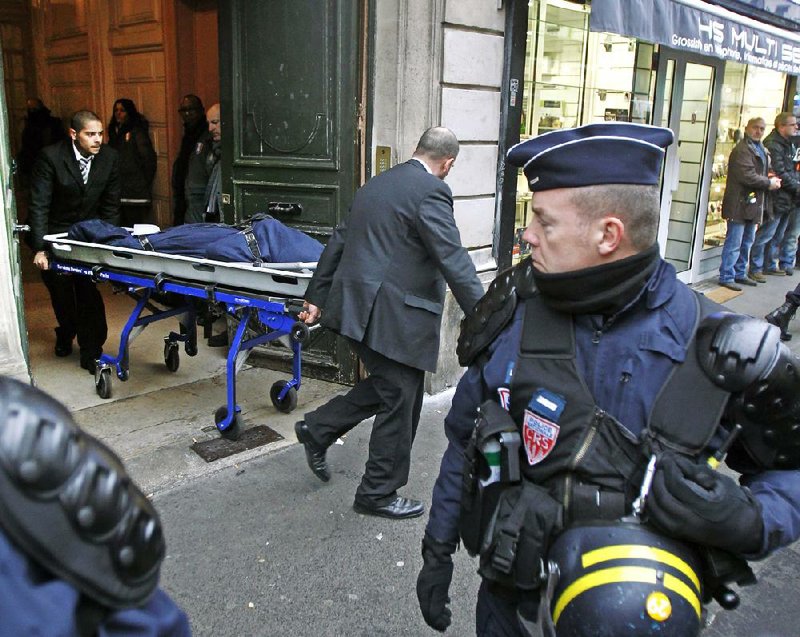PARIS — Three Kurdish activists were shot dead in what authorities called an “execution” in central Paris, prompting speculation that the long-running conflict between insurgents from the minority group and Turkey was playing out on French shores.
The women’s slayings came as Turkey was holding peace talks with the Kurdistan Workers’ Party, which seeks self-rule for Kurds in the country’s southeast, to try to persuade it to disarm. The conflict between the group, known as the PKK, and the Turkish government has claimed tens of thousands of lives since 1984.
Turkish Prime Minister Recep Tayyip Erdogan said at a news conference Thursday in Senegal that his country was determined to press ahead with the talks despite the events in Paris, which he suggested could be the result of internal strife or an act to sabotage the talks. The Kurdistan Workers’ Party does have a history of internal killings. But many Kurdish activists and militants were also victims of extra-judicial killings blamed on Turkish government forces in the 1990s.
Initial reports were contradictory but pointed to a grisly crime scene. One Kurdish organization said the door of the building where the women were found just after midnight was smeared with blood, that two of the women were shot in the neck and one in the stomach and that the killer used a silencer. French radio reported that all three were shot in the head.
The killings set off a round of accusations, with each side accusing the other of being behind the deaths. Police tried to contain hundreds of Kurds who flocked to the building in eastern Paris where the bodies were found Thursday, many blaming Turkey and calling the deaths a “political assassination.”
It was not clear if any of the women were members of the Kurdistan Workers’ Party, which Turkey, the U.S. and the European Union consider a terrorist organization. President Francois Hollande said he and several politicians knew one of the women professionally. He did not say which one.
Turkey’s Anadolu news agency identified one of the victims as Sakine Cansiz, in her 50s and a founding member of the group, but French authorities have not confirmed that.
The Paris prosecutors’ office did confirm that the other two victims were Leyla Soylemez and Fidan Dogan, both in their 20s. A news agency linked to the Kurdistan Workers’ Party, Firat news, said Dogan was the Paris representative of the Kurdistan National Congress. It said she became a Kurdish-rights activist in 1999.
The slayings are being investigated by France’s antiterrorism police.
Emotions mounted Thursday as Kurds flocked to the center where the bodies were found. Police put up barricades to try to contain the marching crowd of several hundred. The crowd waved Kurdish flags and chanted angrily against the Turkish government.
Just hours after the bodies were found, Kurdish groups at the scene handed out strips of paper with pictures of three women, identified as Cansiz, Soylemez and Dogan.
French Interior Minister Manuel Valls, who visited the Kurdistan Information Center in Paris where the bodies were found, said the deaths were “without doubt an execution.” He called it a “totally intolerable act.”
Paris has long been a home to exiled opposition movements — often from countries that used to be part of France’s colonial empire — and has been a killing ground for some of them. But it’s been years since such an assassination has unfolded in France.
During Lebanon’s civil war, the Lebanese Armed Revolutionary Factions claimed responsibility for the killings of an American military attache and an Israeli diplomat in Paris. Georges Ibrahim Abdallah, whom police have described as the group’s leader, was convicted of complicity in the 1982 killings.
In 1991, Shahpour Bakhtiar, the prime minister to Iran’s last shah, was stabbed and strangled in his home in a western suburb of Paris. His aide also was killed. A decade earlier, Bakhtiar had survived another assassination attempt, also outside Paris.
Kurdish leaders who gathered Thursday accused France of working against the Kurdish cause.
“I, too, want France to ask the question: Why Paris?” asked Songul Karabulut, who heads the foreign-relations committee of the Kurdistan National Congress. “Without accusing France, in the last few years, the country that has most repressed the rights of Kurds has been France.”
She said Cansiz had been granted refugee status by France. Devris Cimen, head of the Frankfurt-based Kurdish Center for Public Information, also said Cansiz had been granted asylum. The Interior Ministry did not immediately reply to requests for comment.
Information for this article was contributed by Elaine Ganley, Jamey Keaten, Lori Hinnant and Sohrab Monemi of The Associated Press.
Front Section, Pages 5 on 01/11/2013

